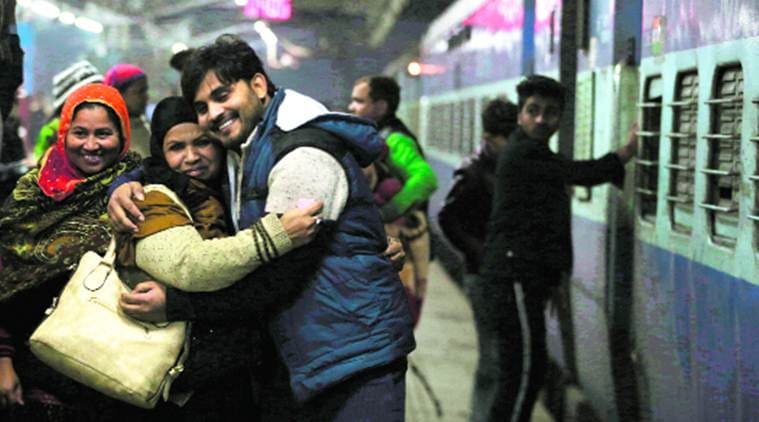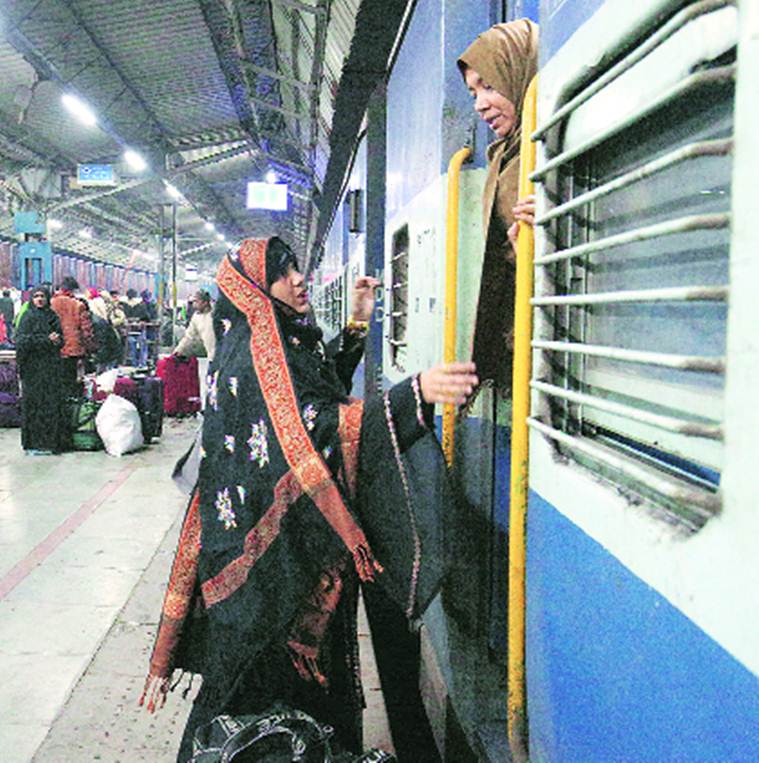
How fair is it to ask a woman to choose between her ‘mayka’ and ‘sasural’? Or a teenager to pick between MS Dhoni and Shahid Afridi?
Under a light drizzle on Old Delhi Railway Station’s platform 1, a mother and son grappled with these dilemmas, amplified after the attack on a CRPF convoy in Pulwama that killed 40.
Residents of Karachi, Salma Munavvar (48) and Shayan (16) were among the 86 passengers, including 14 Pakistani nationals, on the Samjhauta Link Express, which reached Delhi from Lahore, via Attari border, around 4.05 am Tuesday.
As the train arrived 45 minutes behind schedule, the platform stood witness to a gamut of emotions: Two sisters reuniting after three decades; a grandmother embracing her grandson for the first time; a new mother returning home with her infant; a large family returning from a wedding in Multan.
Explained: How China keeps blocking India from listing Azhar a ‘global terrorist’
“Ye do mamooli mulk hain, mamooli logon ke. Humein ek doosre se kya taklif? Kabhi Pakistan jaake toh dekhiye (These are two ordinary nations, with ordinary people. What issues can we have? Try visiting Pakistan once, you will understand),” said Abdul Hasan from Faridabad, back from a month-long Lahore trip with his wife.
“Wo (Pakistan) sasural hai, ye (India) mayka hai. Who doesn’t like coming back home?” asked Salma, who last visited India in 1991. On Tuesday, she returned with her son Shayan, who is on his first visit to the country.
Embracing Salma after ages, tears streamed down the wrinkled cheeks of her elder sister Saulak Jahan (75). “Our mother had one last wish — to see Salma. But it was not to be,” Saulak said. Their mother, Asmat Jahan, died 10 days ago at the age of 95.
Shayan, meanwhile, was surrounded by several cousins who had come to greet him. “Back home, among friends, the buzz word is brotherhood. There’s no animosity whatsoever against India. We have shared heroes in cricket — I like Shahid Afridi as much as I like MS Dhoni,” he said.
His cousin Uzair Khan (28) rued how the “entire kaum (community) is tarred for acts committed by delinquent individuals”. “Aap ye batao, India mein Pakistan se zyada Musalman hain ya nahi? We love our country. Toh ye sab sawaal baar baar kyun uthta hai?” Uzair said.

Mohammed Zaki, who had gone to visit his wife in Pakistan, said he has gathered from visits that “unlike what is shown to us on channels”, Pakistani people want to explore India, but are “suspicious of government agencies in both countries”.
Explained: Why is China shielding Jaish?
“It is not as if India is all they talk about. People are busy leading their lives, just as we are in India. I can vouch for that after having spent two months in Multan,” Rabiya, a housewife from Meerut, said. She was travelling with her husband, Mohammed Chaman.
The Samjhauta Express, a bi-weekly special train operational since 1976, has made two trips to Delhi since the Pulwama attack. The service was suspended for two years, between 2002 and 2004, after the Parliament attack. On February 18, 2007, at least 68 people were killed after a blast, near Panipat, ripped through the train, which was on its way to Lahore.
On Tuesday, neither the twelfth anniversary of the blast nor the Pulwama attack were talking points on platform 1, which had no security presence. However, there were hushed apprehensions and grievances.
Pakistani nationals said they are unsure of exploring India in light of the prevailing tension, and are planning to spend their time with their families, indoors.
Karachi resident Masuda Bano (48) pointed out the “unnecessarily harsh baggage checking” at the Attari checkpost. At Attari, one leg of the journey ends as passengers deboard the Pakistan Railways train and board the one run by the Indian Railways till Delhi.
“Our suitcases and bags were opened and everything was brought out. They are quite harsh. On the Pakistani side, at the Wagah checkpoint, things were smoother,” Bano, whose husband owns a construction business, said.
Travelling with Bano is her younger sister Mobina, who got married in 2001, also in Karachi. The sisters originally hail from Kalyan in Maharashtra’s Thane district and will spend the night at a hotel before taking the train to Mumbai.
“We are travelling alone, mostly because our husbands have repeatedly faced visa rejection. It is very difficult for Pakistani men to get visas to India. This is one thing which should be simplified,” Mobina said.
On where she prefers living —Karachi or Mumbai — Masuda echoes Salma: “Ye mayka, wo sasural, bura koi sa bhi nahi hai.” Around 4.30 am, as the train leaves, Bano quips: “Whatever the differences, there’s one similarity between the two nations. Toilets dono hi train ke bohot gande the (the toilets were equally bad in both trains).”